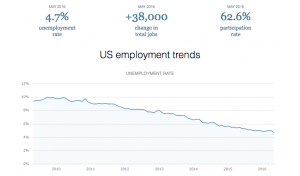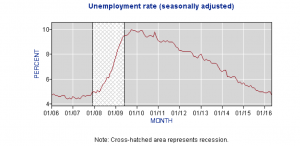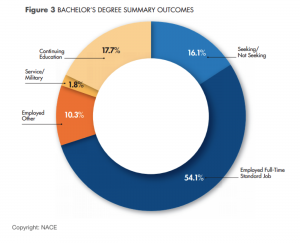Over the last few years we’ve heard a lot about a competitive job market, and it definitely changes the day-to-day life of recruiters everywhere. Everything from writing job descriptions to providing a better candidate experience to recruiting passive candidates to searching resume databases just has to be performed better when the candidates have more career options.
Don’t get me wrong, a healthy job market is better for everyone; recruiters just need to know how to adapt. But just how healthy is this job market? Are we really in a dystopia where the few remaining active jobseekers are completely unskilled and passive jobseekers can’t be bothered to hear about new opportunities? Not quite. In fact their are signs that the job market is turning for the worse.
- “Hiring is at a 5-year low.”
With only 38,000 jobs added over the last month, America is almost losing as many jobs as it gains. This is dangerous territory for labor participation rate; it’s the worst it’s been since September 2015. As the baby boomers age, we’re seeing a unique economic situation where unemployment and labor force participation can drop together. For recruiters, this means that the pool of candidates to poach from other companies is smaller, the pool of candidates who could be convinced to join or re-join the labor force is larger, and with hiring tightening up in general, recruiters need to keep performing well or they could find themselves out of a job.

- 56% of small to mid-market business owners said they’re hiring 🙂
The NFIB Research Foundation’s survey results are more optimistic than the BLS report above. And so recruitment and staffing agencies should continue to look for contingent and retainer work from small- to medium-size businesses as most of them are currently hiring.
- But 48% of small to mid-market business owners who are hiring report finding “few or no qualified applicants for the positions they were trying to fill.” 🙁
Overall, the same NFIB survey revealed that almost half of business are not finding enough qualified candidates. Are their expectations too high of what a qualified candidate is? Maybe. But even so, that’s only part of the story. Small businesses need to modernize their recruitment efforts to source more qualified candidates. That means small businesses need to put the pedal to the metal on their referrals, recruitment marketing execution, and employer branding efforts; additionally, recruitment and staffing firms have an opportunity to earn their business as almost half want to hire and are having difficulty doing so.
- 4.7% current unemployment.
The current rate remains healthily low. If you’re wondering about what I mean -‘healthily low’- know that many economists believe some unemployment is needed to ensure turnover and innovation. For recruiters this means there is not great opportunities to source from the unemployed candidate pool as it’s undersized. With fewer unemployed people, this also could mean less applicants for job postings as less people are actively looking for a job. When unemployment is low, recruiters may want to consider spending more of their time actively reaching out to individual candidates.

- And yet there are 5.1 Million monthly hires
Big picture: with all the dissatisfactions of not being able to find the perfect candidate, 5+ million hires are still happening every month in the US.
- 54.1% of 2015 graduates are employed full-time
In terms of new talent entering the workforce, the numbers are optimistic. With 54% of graduates having full-time jobs, that creates a sizable talent pool of candidates with degrees and one year experience to hire from. Plus the 10% who have part-time work (marked as “employed other” above) are another interesting pool to hire from as many may be willing to take a reduced rate to get more hours.

- Hiring of new grads is expected to jump 15% this year, which will be the second year a double-digit increase has been recorded.
When it comes to hiring the next generation of workers, competition is very fierce. This will only continue to be the case as baby boomers retire. Recruiters need to have built their university talent pools yesterday. If they don’t already have a large university talent pool, this means recruitment departments should spend more on their campus presence and advertising to students online.
The job market is competitive, and the recruiter – more so than most fields – is subject to its troughs and peaks. If the number of jobs in the job market keep declining – as the low monthly job gain numbers indicate it may – applications per job will rise but businesses’ willingness to pay recruiters will decline. To make yourself invaluable, make sure you’re adapting as the economy continues to evolve.
 MightyRecruiter
MightyRecruiter




Leave a Reply